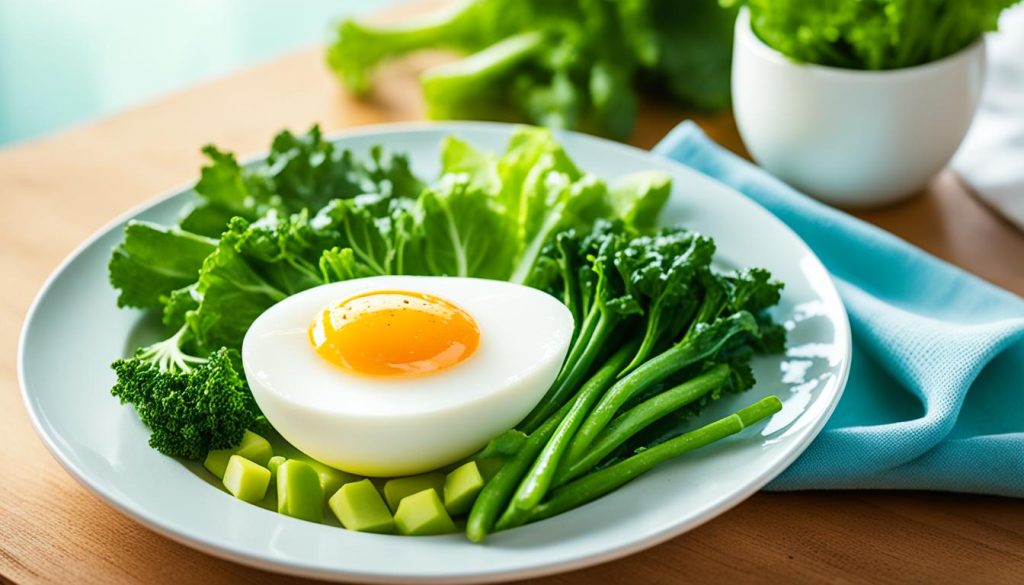Welcome to our article on the egg diet, a popular fad diet that claims to offer fast weight loss and numerous health benefits. The egg diet involves consuming multiple servings of hard-boiled eggs daily, along with lean proteins, non-starchy vegetables, and low carbohydrate fruits.
While the diet encourages the consumption of healthy food groups, it is important to note that it is highly restrictive, difficult to follow, and may not be effective for long-term weight loss. According to Healthline’s diet score of 1.33 out of 5, the egg diet falls short in terms of sustainability and overall effectiveness.
Despite its promises of quick weight loss, it is worth considering that any weight shed during the egg diet may easily be regained once individuals revert to their usual eating patterns. Therefore, it is essential to approach this diet with caution and be aware of its limitations.
In the upcoming sections, we will delve deeper into the specifics of the egg diet, explore its potential benefits and drawbacks, provide a meal plan, and discuss alternative approaches to weight loss and overall health. Stay tuned!
What is the Boiled Egg Diet?
The boiled egg diet is a low carb, low calorie eating plan that aims to promote weight loss. Followers of this diet are restricted to specific foods for each meal of the day. The core components of the diet include eggs or other types of lean protein, non-starchy vegetables, and low carb fruits. Proponents of the boiled egg diet claim that it can lead to short-term weight loss and offer various health benefits. However, it’s important to note that these health claims lack scientific evidence to support them.
The basic concept of the boiled egg diet revolves around consuming low carb and low calorie foods. By reducing carbohydrate intake, the diet aims to initiate a state of ketosis in the body where it burns fat for fuel instead of carbohydrates. This can potentially result in weight loss.
In addition to eggs or lean protein, non-starchy vegetables play a significant role in the boiled egg diet. These vegetables provide essential nutrients, fiber, and help create a feeling of fullness. Examples of non-starchy vegetables commonly included in the diet are leafy greens, broccoli, cauliflower, and peppers.
The inclusion of low carb fruits adds some variety and natural sweetness to the diet. Fruits such as berries, citrus fruits like oranges and grapefruits, and apples are often recommended on the boiled egg diet.
While the boiled egg diet may seem promising, it is essential to approach it with caution. The health claims associated with this diet should be viewed with skepticism until supported by scientific research. It’s always advisable to consult a healthcare professional or a registered dietitian before starting any new diet plan.

How to Follow the Boiled Egg Diet?
The boiled egg diet is a specific eating plan that requires followers to stick to a set meal plan for each day. It is important to note that this diet restricts snacks in between meals. Here is a breakdown of what you should eat on the boiled egg diet:
- Breakfast: Start your day with a nutritious breakfast consisting of eggs, a non-starchy vegetable, and a low carb fruit. This combination provides you with protein, vitamins, and minerals to keep you energized throughout the morning.
- Lunch: For lunch, focus on consuming non-starchy vegetables alongside eggs or another lean protein source. This will help you feel satisfied and support your weight loss goals.
- Dinner: Similar to lunch, dinner should include non-starchy vegetables and eggs or another lean protein option. This combination ensures a well-rounded meal while adhering to the boiled egg diet.
In addition to following the recommended meal plan, incorporating light physical activity into your daily routine can help maximize the results of the boiled egg diet. Whether it’s taking a brisk walk, cycling, or practicing yoga, aim to move your body regularly. Exercise is essential for overall health and can aid in weight loss.
It is crucial to remember that the boiled egg diet should only be followed for a few weeks at a time. This ensures that you do not miss out on important nutrients and allows for a smoother transition back to your regular eating habits. As with any dietary changes, it is always recommended to consult with a healthcare professional before starting a new diet.

Does the Boiled Egg Diet Help with Weight Loss?
The boiled egg diet is often touted as a quick and effective way to shed pounds. With its emphasis on low carbs and low calories, it creates a calorie deficit that can potentially enhance weight loss efforts. By restricting your intake and focusing on lean proteins like eggs, along with non-starchy vegetables and low-carb fruits, you may see some short-term weight loss results.
However, it’s important to note that any weight lost during the boiled egg diet may be regained once you resume your typical eating habits. The diet’s restrictive nature and short-term approach make it difficult to sustain as a long-term weight loss solution. It is crucial to understand that sustainable weight loss requires a balanced, healthy lifestyle rather than relying on short-term fad diets.
Furthermore, while the boiled egg diet may create a calorie deficit, it lacks sufficient evidence to support its effectiveness for prolonged weight loss. Sustainable weight loss is best achieved through a combination of a balanced, nutrient-rich diet and regular physical activity.
It is essential to prioritize your overall health and well-being rather than solely focusing on short-term weight loss goals. Instead of following restrictive diets that may lead to weight fluctuations, consider adopting a more holistic approach to weight management.
Conclusion
The egg diet, while it may offer some health benefits, has several downsides that make it an unreliable long-term solution for weight loss and overall health. The diet is low in calories and low in fiber, which can lead to fatigue and nutrient deficiencies over time. Additionally, it lacks the well-rounded nutrition needed to meet recommended dietary guidelines.
One of the concerns with the egg diet is the potential for calcium deficiency and reduced bone density. While eggs contain some calcium, they are not a significant source, and relying heavily on eggs as the main protein source can lead to inadequate calcium intake, putting bone health at risk.
Another consideration is the high cholesterol content in eggs, which may be problematic for individuals at risk of heart disease or with high cholesterol levels. While dietary cholesterol does not have as strong of an impact on blood cholesterol levels as once thought, it is still important to consume cholesterol in moderation and consider the overall dietary context.
A more balanced and sustainable approach to weight loss and overall health is recommended. Diets like the Mediterranean and DASH diets, which include a variety of nutrient-dense foods and promote overall well-being, are better choices for achieving long-term success. It’s important to prioritize a diet that is not only effective for weight loss but also supports overall health and provides adequate nutrients for optimal well-being.
FAQs
Is the boiled egg diet effective for weight loss?
The boiled egg diet may lead to weight loss due to its low calorie and low carb nature, creating a calorie deficit. However, any weight lost may be regained once one resumes their typical diet.
What foods are allowed on the boiled egg diet?
The boiled egg diet allows for foods such as eggs, lean proteins, non-starchy vegetables, and low carb fruits.
Can I snack between meals on the boiled egg diet?
No, the boiled egg diet restricts snacking between meals.
How long should I follow the boiled egg diet?
The boiled egg diet should only be followed for a few weeks at a time, with a transition period to ease back into a regular diet.

